
Ernesto Teodoro Moneta was born on September 20, 1833, in Milan, Italy. He came from a humble background and received only limited formal education. At age 15, he participated in the 1848 uprising against the Austrian rule of Milan that became known as the “Five Days of Milan.” He later attended the military academy in Ivrea, and in 1859 joined Garibaldi’s Expedition of the Thousand (also known as “Garibaldi’s Redshirts”). The Expedition of the Thousand was aimed at unifying the various states and regions of Italy into a single nation. The Redshirts prevailed in battle, later forcing a plebiscite that brought Naples and Sicily into the Kingdom of Piedmont-Sardinia. This victory was eventually followed by the proclamation of the Kingdom of Italy on March 17, 1861 that created the nation of Italy.
After experiencing the horrors of war during the Italian Wars of Independence, Moneta became a staunch pacifist. He believed that war was a senseless and destructive endeavor and that nations should work towards the peaceful resolution of conflicts. In 1867, he began his career as a journalist, serving as editor of the Milan democratic newspaper Il Secolo (the Century). He retained this position until 1896, and became known for his advocacy of republican and liberal ideals.
In 1890 Moneta founded the Lombard Association for Peace and Arbitration that called for disarmament and envisaged the creation of a League of Nations that would resolve conflicts through arbitration. In 1907, Ernesto Teodoro Moneta was awarded the Nobel Peace Prize, along with French pacifist Frédéric Passy. He received this prestigious award for his dedicated efforts to promote peace and disarmament.
In his later years, Moneta continued to work tirelessly for the cause of peace. He was an advocate for international arbitration and the resolution of conflicts through diplomacy. Ernesto Teodoro Moneta passed away on February 10, 1918, in Milan, Italy, at the age of 84.
